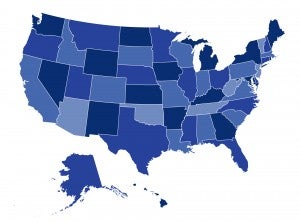
By Sabrina Corlette, Emily Curran and Justin Giovannelli
The Affordable Care Act (ACA) created health insurance marketplaces to make it easier for consumers to shop for and compare plan options in one place. As of December 24, 2016, over 11.5 million people had signed up for coverage through the marketplaces, and the U.S. Department of Health and Human Services projects that 13.8 million consumers will have selected a plan for 2017 by the close of this open enrollment period.
However, a new president and Congress are committed to the repeal of the ACA. Repeal could cause as many as 30 million to lose coverage, 9.3 million of whom receive federal premium assistance through the marketplaces. Nearly one-third of these enrollees reside in the 17 states that embraced the chance to set up and manage their own ACA marketplace.* All but one of these states also expanded their Medicaid program and most incorporated the ACA’s consumer protections into their own state insurance laws, effectively adopting them as their own. These states not only embraced the ACA’s vision of improving access to affordable, quality health coverage, but also took full advantage of the flexibility for states provided under the law to design an insurance market to meet local needs.**
In their most recent article for The Commonwealth Fund’s To the Point, CHIR experts review the progress of 17 states that ran their own marketplaces to expand coverage and stabilize their markets. Read more here.
* For purposes of this analysis, we count the District of Columbia as a state. Enrollment data include Hawaii, which recently transitioned to the federal marketplace with the state maintaining plan management responsibilities, and does not include Arkansas, which transitioned to a state marketplace using the federal platform for the 2017 benefit year.
** One of these states, Massachusetts, adopted market reforms and created a marketplace prior to enactment of the ACA. Its efforts provided a model for the ACA’s coverage expansion provisions.

